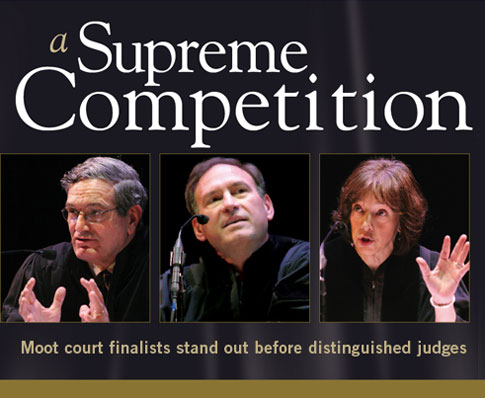
(left) Jose A. Cabranes was appointed to the U.S.
Court of Appeals for the 2nd Circuit in 1994. (center)
Supreme Court Justice Samuel A. Alito Jr. presided
over the competition, which drew a crowd of 1,300
people. Last year, Chief Justice John G. Roberts
Jr. sat on the bench. (right) Diane P. Wood was
appointed to the U.S. Court of Appeals for the 7th
Circuit in 1995.
By Jaime Ciavarra
Few things can make a GW Law student
speechless. Arguing before a Supreme Court Justice
is not one of them.

|
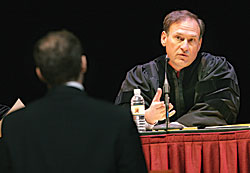
Supreme Court Justice
Samuel A. Alito Jr. grills a competitor
during the hour-long proceeding. This year’s
fictional case, The United States of America
vs. Adam Jones, focused on a private online
chat room quandary.
|
With an articulate performance in February, four
of the brightest GW competitors addressed a modern
legal problem before Supreme Court Justice Samuel
A. Alito Jr., and U.S. Court of Appeals Judges
Jose A. Cabranes and Diane P. Wood during the
school’s oldest and most popular oral contest.
The 57th annual Van Vleck Constitutional Law
Moot Court Competition showcased yet another rigorous
and impressive panel of the nation’s best
legal minds a year after Supreme Court Chief Justice
John G. Roberts Jr. took center stage.
The arguments were tough and the judges even
tougher.
In a packed Lisner Auditorium, the four competitors—second-year
students Eric Klein and Jonathan Bond for the
petitioner, and third-year students Katherine
Borden and Joshua Douglas for the respondent—each
confronted a 15-minute questioning in what was
a complex test of knowledge and fluency on the
application of First and Fourth Amendment rights
to private online chat rooms.
Klein, who was awarded best oral presentation
and best written brief, spent weeks practicing
for a “hot bench,” he says.
Alito, Wood, and Cabranes delivered.
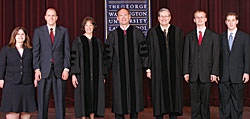
Respondents Katherine Borden and Joshua
Douglas, 7th U.S. Circuit Court of Appeals
Judge Diane P. Wood, Supreme Court Justice
Samuel A. Alito Jr., 2nd U.S. Circuit Court
of Appeals Judge Jose A. Cabranes, and petitioners
Jonathan Bond and Eric Klein.
|

|
“My strategy was to try to anticipate everything
they could possibly ask,” Klein says. “But
all of us could claim that we didn’t get
stuck, we weren’t lost for answers. You
come away from that with a lot of confidence.
Some of the best judges in the country had a go
at you, and you didn’t buckle.”
The fictional case, named The United States
of America vs. Adam Jones, underscored the
increasing complexity of post-Sept. 11 America.
In the problem, FBI agents used an Internet service
provider to monitor a private message board without
a warrant after learning that several board members
were contributing money to terrorist organizations
abroad.
The judges fired questions rapidly and steadily.
Did the FBI violate any Fourth Amendment rights?
Did the investigatory processes infringe on the
group’s associative freedom? Does the First
Amendment require that evidence gathered be excluded
at trial?

|
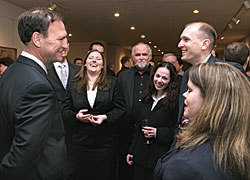
The visiting judges
took time to chat with law students after
the competition. Alito recounted being “badgered”
by judges during an oral contest when he
was in law school. “You can tell [GW’s
competitors] poured their heart into this,”
he said.
|
Klein and Bond defended the argument that clandestine
observation of an online message board does not
constitute an illegal search. They won the competition
and will be awarded the Jacob Burns Award for
their performance. Named after the 1924 alumnus
and former trustee, the accolade given to the
Van Vleck champions is considered one of the Law
School’s highest honors.
After the hour-long contest, the judges noted
that the problem, penned by law students Tiffany
Joslyn and Sheerin Shahinpoor, explored the complex
issues of cyber-privacy, a topic that is being
addressed in courts across the country.
“These were interesting questions that
deal with timely issues, important issues,”
Alito said to the crowd of more than 1,300 people.
He called the competitors fluent, poised, and
knowledgeable.
“You can tell they poured their heart into
this,” Alito said.
The Van Vleck competition has for years attracted
the most articulate students and high profile
judges. In this 2007 contest, the finalists beat
out nearly 100 other competitors—the highest
number in GW history—to vie for the esteemed
spots.
Part of the lure, students and event coordinators
say, is having the opportunity to argue before
the best. With back-to-back Supreme Court justices
reigning over the competition, the pressure is
mounting to continue the trend.
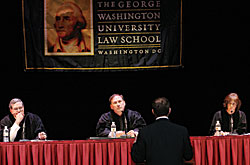
Supreme Court Justice Samuel A. Alito Jr.,
center, and U.S. Court of Appeals Judges
Jose A. Cabranes (2nd Circuit) and Diane
P. Wood (7th Circuit), hear arguments in
the finals of the Van Vleck Constitutional
Law Moot Court Competition. The school’s
oldest oral contest drew more than 100 competitors
this year, the largest number in the Law
School’s history. |

|
Next year’s “anchor” position
is already in the works, says David Johnson, the
Law School’s senior assistant dean for student
affairs and director of advocacy programs.
“For one day, the Law School pretty much
shuts down,” he says. “We are very
much committed to keeping that excitement alive.”
For Bond, the competition meant months of practice
and informal mooting with friends and professors.
He says he was prepared for the judges to wrap
up the easy questions early and get into the heart
of the issue. They did, and he responded.
“Because you knew the pressure of this
competition, you spent so much time gearing up
for your argument,” Bond says. “While
they are very challenging and well-respected judges,
it’s the same fundamental issue. In the
end, you do the same thing you do everywhere else.
Arguing before a Supreme Court justice is just
like any other panel.”
All of the competitors were relaxed and articulate,
even in the eye of a supreme legal storm.
“That’s a big confidence booster,”
Bond says.
Who was Van Vleck?
The man who inspired the Law School’s
most popular oral contest was always committed
to keeping GW at the top of its game. William
C. Van Vleck, BA ’08, LLB ’11,
was a longtime professor and dean at the
University who dedicated more than four
decades to shaping students’ legal
minds. A native Washingtonian, Van Vleck
saw the enrollment of the Law School triple
during his 24-year tenure as dean, and he
continued teaching law at the University
even after he retired from his administration
position in 1948. He earned a Doctor of
Juridical Science from Harvard University
and honorary Doctor of Laws from GW. In
1956, Van Vleck died at age 70. |

GW Competition Victories
Law School students snag top honors at
oral advocacy competitions across
the nation this academic year
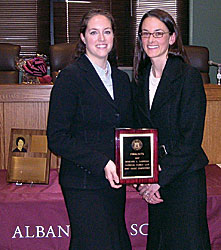
Melissa Colangelo and Emily McDonald
were among the many GW students who
shined in contests around the country
this year. They were finalists in
the Domenick Gabrielli Family Law
Moot Court Competition in Albany,
N.Y. |

|
Regional Victory
Katherine Borden won Best Oral Advocate
at the National Sexual Orientation Law Moot
Court Competition at UCLA in February. The
contest, which was in its third year, is
the only national competition dedicated
exclusively to sexual orientation law. Borden
was awarded $300.
Other Successes
GW Law School proudly inaugurated the National
George Washington Religious Freedom Moot
Court Competition in January. Professors
Ira C. Lupu and Robert W. Tuttle, co-directors
of the Project on Law and Religious Institutions,
oversaw the drafting of the Moot Court problem
that implicates a First Amendment controversy.
The competition focused on the rights of
religiously oriented student organizations
at state-affiliated institutions of higher
learning. Twelve teams from across the country
came to the Law School to participate. The
final argument was presented before a distinguished
panel of Judge Kent A. Jordan of the U.S.
Court of Appeals for the 3rd Circuit, Judge
John M. Rogers of the U.S. Court of Appeals
for the 6th Circuit, and Professor Martin
S. Lederman of the Georgetown University
Law Center, former adviser on religious
freedom issues for the U.S. Justice Department’s
Office of Legal Counsel. The GW Law team
of Jeffrey Bailey and Irene Ayzenberg progressed
to the semi-finals and received honorable
mention for Best Brief. Bailey also received
honorable mention for Best Oralist in the
preliminary rounds.
Neil Chilson, Colin O’Sullivan, and
Adam Copeland reached the finals and placed
second in the 2007 National Telecommunications
Moot Court Competition, which took place
Feb. 2 and 3 at Catholic University. The
competition was sponsored by the Federal
Communications Bar Association.

|
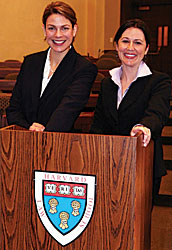
Alexandra Gabrielle
Freidberg and Alison Meeker Schiebelhut
advanced to semi-finalist in the Animal
Law Moot Court Competition at Harvard
Law.
|
The GW Jessup Team competed at George Mason
University in the Mid-Atlantic Regional.
The team of Antonia Rahvena, Jered Matthysse,
Rebekah Matter, and George Murphy was awarded
Best Team Memorial (fourth place). They
advanced to the second day of competition
and ended in the semi-finals. Highlights
included wins over Georgetown University
and Catholic University. Susan Karamanian
is the team’s coach.
The team of Alexandra Gabrielle Freidberg
and Alison Meeker Schiebelhut won a plaque
for advancing to semi-finalist in the Animal
Law Moot Court Competition in March at Harvard
Law. Professor Joan Schaffner was their
coach.
In March, Melissa Colangelo and Emily McDonald
were finalists in the Domenick Gabrielli
Family Law Moot Court Competition in Albany,
N.Y. Professor Catherine Ross was the coach,
and Colangelo and McDonald were awarded
a plaque for their efforts.
The Law School recently was the forum for
oral argument in real cases. The U.S. Navy-Marine
Corps Court of Criminal Appeals held oral
arguments in the Law School’s Moot
Courtroom, providing GW students with the
opportunity to see and hear an actual military
justice proceeding. |
|